Thank you for downloading this Simon & Schuster ebook.
Get a FREE ebook when you join our mailing list. Plus, get updates on new releases, deals, recommended reads, and more from Simon & Schuster. Click below to sign up and see terms and conditions. CLICK HERE TO SIGN UP Already a subscriber? Provide your email again so we can register this ebook and send you more of what you like to read. You will continue to receive exclusive offers in your inbox.
We hope you enjoyed reading this Simon & Schuster ebook.
Get a FREE ebook when you join our mailing list. Plus, get updates on new releases, deals, recommended reads, and more from Simon & Schuster. Click below to sign up and see terms and conditions. CLICK HERE TO SIGN UP Already a subscriber? Provide your email again so we can register this ebook and send you more of what you like to read. You will continue to receive exclusive offers in your inbox.
ALSO BY HAROLD BLOOM Lear: The Great Image of Authority Cleopatra: I Am Fire and Air Falstaff: Give Me Life The Daemon Knows The Shadow of a Great Rock: A Literary Appreciation of the King James Bible The Anatomy of Influence: Literature as a Way of Life Till I End My Song: A Gathering of Last Poems Fallen Angels American Religious Poems: An Anthology Jesus and Yahweh: The Names Divine Where Shall Wisdom Be Found? The Best Poems of the English Language: From Chaucer Through Frost Genius: A Mosaic of One Hundred Exemplary Creative Minds Hamlet: Poem Unlimited Stories and Poems for Extremely Intelligent Children of All Ages How to Read and Why Shakespeare: The Invention of the Human Omens of Millennium The Western Canon The American Religion The Book of J Ruin the Sacred Truths Poetics of Influence The Strong Light of the Canonical Agon: Towards a Theory of Revisionism The Breaking of the Vessels The Flight to Lucifer: A Gnostic Fantasy Wallace Stevens: The Poems of Our Climate Figures of Capable Imagination Poetry and Repression A Map of Misreading Kabbalah and Criticism The Anxiety of Influence The Ringers in the Tower: Studies in Romantic Tradition Yeats Commentary on David V. Erdmans Edition of The Poetry and Prose of William Blake Blakes Apocalypse The Visionary Company Shelleys Mythmaking


Scribner An Imprint of Simon & Schuster, Inc. 1230 Avenue of the Americas New York, NY 10020 www.SimonandSchuster.com Copyright 2018 by Harold Bloom All rights reserved, including the right to reproduce this book or portions thereof in any form whatsoever. For information, address Scribner Subsidiary Rights Department, 1230 Avenue of the Americas, New York, NY 10020. First Scribner hardcover edition May 2018 SCRIBNER and design are registered trademarks of The Gale Group, Inc., used under license by Simon & Schuster, Inc., the publisher of this work. For information about special discounts for bulk purchases, please contact Simon & Schuster Special Sales at 1-866-506-1949 or .
The Simon & Schuster Speakers Bureau can bring authors to your live event. For more information or to book an event, contact the Simon & Schuster Speakers Bureau at 1-866-248-3049 or visit our website at www.simonspeakers.com. Interior design by Erich Hobbing Jacket design by Jonathan Bush Jacket photograph of Frank Finlay as Iago by Af Archive / Alamy Stock Photo Library of Congress Cataloging-in-Publication Data is available. ISBN 978-1-5011-6422-4 ISBN 978-1-5011-6424-8 (ebook) For David Bromwich
Acknowledgments
I am happy to thank Nan Graham, my devoted editor, and Alice Kenney, for her kindness and constancy as my research assistant. As always I am indebted to Glen Hartley and Lynn Chu, my literary agents for the last thirty years. To Glen Hartley I have the particular debt that he suggested this sequence of five volumes on Shakespeares personalities.
I am also grateful for the skilled editorial work of Tamar McCollom and Stephanie Evans. The dedication is to the most gifted student I have ever taught, who goes on teaching me.
Authors Note
I follow David Bevingtons text of Othello , in the fifth edition of his The Complete Works of Shakespeare (2004). Bevington bases his work on the First Folio (1623). I have repunctuated in a few places, in accordance with my understanding of the text.
CHAPTER 1
Keep Up Your Bright Swords, for the Dew Will Rust Them
We do not know whether William Shakespeare was ever out of England.
CHAPTER 1
Keep Up Your Bright Swords, for the Dew Will Rust Them
We do not know whether William Shakespeare was ever out of England.
From 1585 to 1589 he is lost to public records and notice. Presumably he was making a start in the London theater but we can only surmise. I remember that when I went to Elsinore (Kronborg Castle in Helsingr, Denmark) and entered the Great Hall, I had a sense that Shakespeare must have seen it. There is a tradition of Hamlet performances in the Great Hall that includes John Gielgud, Laurence Olivier, Derek Jacobi, and David Tennant. Even had Shakespeare gone to the Continent, perhaps with a company of actors, it seems unlikely that he ever saw Venice. Both Othello, the Moor of Venice and The Merchant of Venice convey the atmosphere of that once powerful city-state, whose decline was highly evident in the Age of Shakespeare.
Othello is the most painful play in all of Shakespeare and in some ways it is elliptical and strangely enigmatic. Othellos race is never explicit. Is the Moor Othello an African black man or is he Berber or Arab? In our time there is a necessity that he must be played as and by a black actor. In the initial production in 1604, Othello was played by Shakespeares principal actor Richard Burbage while Iago was played by Robert Armin, who in 1600 had replaced the unruly Will Kemp as the companys clown or fool. We do not know whether Burbage acted in blackface or was portrayed as Arab. A Moor might have been either in 1604, and Shakespeare must have observed the variety of African races when the ambassador of Morocco and his entourage were in London during 16012.
The incongruities in Othello are fascinating and crucial. Desdemona is probably fourteen or fifteen at the most. Othello is possibly about fifty. He seems to be rather absentminded or shortsighted and frequently asks Iago what is happening. At once a magnificent captain general of a mercenary army and a kind of child-man given to weeping, he defies any easy understanding. Since Othello clearly is a devout Christian, we wonder whether he was baptized as such or whether he converted.
If he was a convert, it was not from Islam but from paganism. That seems to argue he was an African black man descended from a pagan royal family. The Moors of Morocco had submitted to Islam. Most African blacks farther south were pagans. By his own account, Othello came of royal blood and had become a child-warrior. Having known captivity, he had fought his way free and then pursued a long military career until he attained the unquestioned leadership of the armed forces of Venice.
His worship of Desdemona is more aesthetic than lustful. Her wholesome desire for him far exceeds his carnal interest in her. At different times in this book I will address the highly controversial question of whether Desdemona dies a virgin. As I will show, the textual evidence is that neither Othello nor any other man ever brought her to consummation. I have for nearly three-quarters of a century avidly attended performances of Othello. The first was in November 1943 in New York City with Paul Robeson as Othello, Jos Ferrer as Iago, and Uta Hagen as Desdemona.
The director was Margaret Webster, who also powerfully played the part of Emilia. By far the best Iago I have ever seen was the complex and frightening performance by Frank Finlay, which I saw in London in 1964. Laurence Olivier, acting in blackface, was a very inadequate Othello, acted quite off the stage by Finlay and indeed by the rest of the cast, Maggie Smith as Desdemona, Joyce Redman as Emilia, and Derek Jacobi as Cassio. In more recent years I have seen several splendid performances of Iago, but none to match Frank Finlay. In different ways Kenneth Branagh, the wonderful Simon Russell Beale, and the comedian Rory Kinnear all augmented my apprehension of Iago, but not even Beale matched Finlay. I should add that not once have I seen an adequate Othello, except perhaps Orson Welles in his film version (1951).
Next page
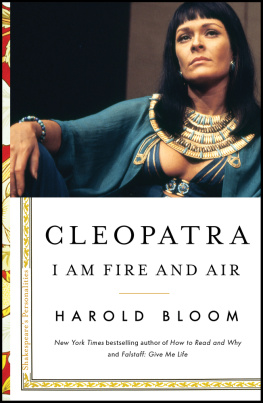
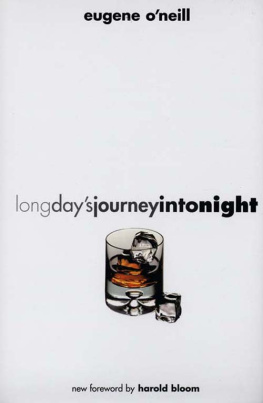
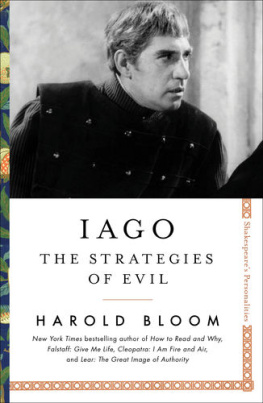

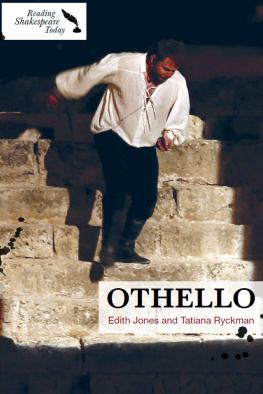

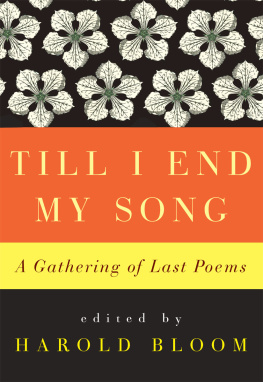

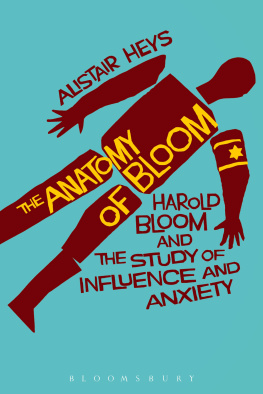

 Scribner An Imprint of Simon & Schuster, Inc. 1230 Avenue of the Americas New York, NY 10020 www.SimonandSchuster.com Copyright 2018 by Harold Bloom All rights reserved, including the right to reproduce this book or portions thereof in any form whatsoever. For information, address Scribner Subsidiary Rights Department, 1230 Avenue of the Americas, New York, NY 10020. First Scribner hardcover edition May 2018 SCRIBNER and design are registered trademarks of The Gale Group, Inc., used under license by Simon & Schuster, Inc., the publisher of this work. For information about special discounts for bulk purchases, please contact Simon & Schuster Special Sales at 1-866-506-1949 or .
Scribner An Imprint of Simon & Schuster, Inc. 1230 Avenue of the Americas New York, NY 10020 www.SimonandSchuster.com Copyright 2018 by Harold Bloom All rights reserved, including the right to reproduce this book or portions thereof in any form whatsoever. For information, address Scribner Subsidiary Rights Department, 1230 Avenue of the Americas, New York, NY 10020. First Scribner hardcover edition May 2018 SCRIBNER and design are registered trademarks of The Gale Group, Inc., used under license by Simon & Schuster, Inc., the publisher of this work. For information about special discounts for bulk purchases, please contact Simon & Schuster Special Sales at 1-866-506-1949 or .